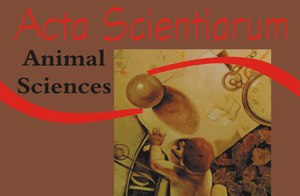Agrochemicals on crop cultivated areas is a source of contamination for bees and may cause physiological and behavioral disorders and mortality. The LD50 of the pesticides fipronil and imidacloprid was determined and their effect on the learning behavior of Apis mellifera L. honeybee evaluated. LD50 was determined by the ingestion of contaminated food with different concentrations of insecticide concentrations: Fipronil (0, 0.8, 0.4, 0.2, 0.1 and 0.05 µg bee-1) and imidacloprid (0, 0.4, 0.2, 0.1, 0.05 and 0.025 µg bee-1). The method of proboscis extension reflection (PER) and learning through citral odor evaluated their responses to food stimulation. LD50 obtained were 0.28 ± 0.11 and 0.10 ± 0.04 µg bee-1 for fipronil and imidacloprid, respectively. The PER test showed no significant difference (p < 0.05) although agrochemicals affected the learning of bees. Insecticides fipronil and imidacloprid are extremely harmful to foraging Africanized Apis mellifera bees.
beekeeping; toxicity; lethal dose


